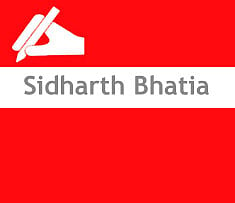Lal Krishna Advani is an astute politician. When he speaks in public, he weighs every word and knows the precise meaning of what he says. A veteran parliamentarian, he understands not just procedure and process but also the deft touches, such as showing courtesy to rivals and opponents even while attacking them in the House. He is an old school politician in today’s India.
Thus, when he says something we must listen and pay heed. After months of silence, Advani has been quoted as saying he fears that India could once again witness an Emergency. By this he does not mean it is imminent, but that the institutional checks and balances that would rule out such an occurrence have not been put in place. He has little faith in the media or indeed the political class, but feels the judiciary remains independent.
These are strong words and coming from someone who was jailed during the Emergency include a veiled warning. He saw the Emergency and its impact up close and understood what exactly was going on—not just as an attempt to bring order to a chaotic country but also as a pretext to suspend fundamental rights and impose one person rule. He felt the full brunt of the state.
Observers have been quick to attribute motive to his remarks. Some see it as a sly dig against Modi, who has a strong, authoritative, even dictatorial streak in him. It is no secret that Advani and Modi do not see eye to eye and the older man feels slighted at how the younger eased him out in the race to become Prime Minister. Advani has reason to feel upset since it was his intervention that saved Modi’s skin after the party was considering asking him to resign after the 2002 riots. After that, there was no looking back for Modi whose star was in the ascendance; meanwhile the BJP lost twice under Advani’s leadership and rose only after Modi was brought in. Advani has been kept out of any decision making and only surfaces occasionally.
It has also been suggested that Advani is angry that his protégé has sidelined him.
Advani’s detractors may have another take on this. It was he, after all, who unleashed the Hindutva monster and converted the BJP from a lackluster party into a major political force. In 1984, the party won just 2 seats in Parliament; in 1996, it came to power, even if for 13 days. It became not just a player, but a lynchpin in Indian politics and has gone from strength to strength in recent times. Had Advani not taken out the ‘rath yatra’ and galvanized people in the north, it wouldn’t have reaped electoral gains and would have remained an also ran. However, he couldn’t repeat the magic in 2004 and then 2009; his work done, the mentors of the party put him out to pasture and brought in a younger and more dynamic leader who has shown results. Advani has much to answer for, therefore.
Sushma Swaraj is being targeted for having helped LalitModi. He feels she is getting an unfair deal and blames others in the party.
Whatever the motive, his remarks come at a time when there is a sense that not only is the government interfering in too many things but that general intolerance is on the rise. The blatantly communal remarks by the BJP and the Sangh Parivar members, the attacks on minorities and liberals, the attempts to curb freedom of expression—all these are troubling signs
in a democratic polity like India. Advani, with his long experience in politics, is joining the dots.
In any event, this remark of Advani must be studied closely. The Emergency, for those readers who are too young to remember, was a time in which people lost their liberties and rights; political opponents, journalists, industrialists and activists who were seen as anti government were thrown into jail. Political activity was banned. Judges were put under pressure to give friendly judgments. Due process was not followed. Young men were forced to undergo sterilisation. Yet, the government declared that the country was on the road to progress and the trains ran on time! Corruption vanished. These were claims difficult to double check, since the press was censored. Some people may yearn for it, but those were not good days and certainly should not be repeated.
Can they be repeated? Is an Emergency possible? Will any leader or government give in to temptation and try and impose it, in perfectly legal ways? There is always that danger. If all the key instruments of state, including the legislature, the executive and the judiciary are brought under the control of one dispensation and the media becomes silent or even acquiesces in this, thus building up public opinion, someone may be tempted to get adventurous. Many things have changed—new technologies make spreading of information quicker and it is difficult to totally censor the online media, but on the other hand, tools exist even for that. If a people are promised economic progress and prosperity, they may just go along with it. It looks far fetched at the moment, but when the intent is there, things can be made to move along rapidly. “Eternal vigilance is the price of liberty,” it has been said. Advani may have triggered off the thought, but it is up to every citizen to ensure that the terrible days of the Emergency do not ever return again.
Sidharth Bhatia






